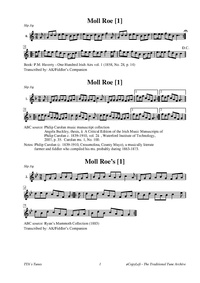Template:Pagina principale/Vetrina: Difference between revisions
No edit summary |
No edit summary |
||
| Line 1: | Line 1: | ||
{{SheetMusic | {{SheetMusic | ||
|f_track= | |f_track=Jig - Moll Roe.mp3 | ||
|f_pdf= | |f_pdf=Moll Roe.pdf | ||
|f_artwork= | |f_artwork=Máire_Rua_O'Brien.jpg | ||
|f_tune_name= | |f_tune_name=Moll Roe | ||
|f_track_title= | |f_track_title=Moll_Roe_(1) | ||
|f_section=abc | |f_section=abc | ||
|f_played_by=[https:// | |f_played_by=[https://soundcloud.com/trad-tune-collection - Fionnlagh Ballantine] | ||
|f_notes= | |f_notes=Máire Rua O'Brien, Irish aristocrat, of Leamaneh Castle. | ||
|f_caption= | |f_caption=The "Moll Roe" referred to was an actual historical person, a redoubtable 17th century lady called Ma/ire Ruadh Ni/ Mahon, thrice-married chatelaine of Leamaneh Castle in County Clare, whose impressive remains stand beside the road from Ennis up to The Burren (the castle's remains, that is, not Ma/ire Ruadh's) | ||
|f_source=[https://soundcloud.com/trad-tune-collection/jig-moll-roe Soundcloud] | |||
|f_source=[https:// | |||
|f_pix=420 | |f_pix=420 | ||
|f_picpix=200 | |f_picpix=200 | ||
|f_article=[[ | |f_article=[[Moll_Roe_(1) | '''Moll Roe''']] | ||
The tune was introduced under the name "Moll Rue" in Henry Brooke's '''Jack the Giant Queller''' in 1748, and it was also called "Moll Rue in the Morning." | |||
It appeared in O'Keefe's '''Poor Soldier''' in 1783, and in O'Farrell's '''A Pocket Companion for the Irish Pipes''' in 1810. | |||
In the journal '''Ceol''' (volume 2, No. 4) we are informed that "Moll Roe," as found in O'Neill's '''Dance Music of Ireland '''(No. 441), is a common name for the tune to the song "[[Taim in Arrears]]". | |||
Breathnach says O'Neill also prints variants under the titles "[[Ditherum Doodle]]", "[[Moll Roe in the Morning]]", "[[Though late I was plump]]" and "[[Munsterman's Flattery]]." As "[[I'll Take a Glass with a Friend]]" it appears in O'Farrell's '''Pocket Companion''' (printed before 1811). | |||
'''Ryan's Mammoth Collection''' (1883) has versions as "Moll Roe's" and "[[Come Under My Dimity]]," while Goodman gives it as "[[Late on a Saturday Night]]" is a variant printed by Goodman, and identifies "[[Night of Fun (The)]]" as a variant. | |||
The "Ditherum Doodle" title for the tune comes from its use as the vehicle for the song "Though late I was plump," in which 'ditherum doodle' starts off the burden or chorus. The lyric was printed in '''The Encyclopedia of Comic Songs''' (1820, p. 500): | |||
<blockquote> | <blockquote> | ||
'' | ''Though late I was plump, round, and jolly,''<br> | ||
'' | ''I now am as thin as a rod;''<br> | ||
'' | ''Oh, love is the cause of my folly,''<br> | ||
''And | ''And soon I'll lie under a sod.''<br> | ||
<br> | ''Sing ditherum doodle, nagety, nagety, tragety rum,''<br> | ||
'' | ''And goosetherum, foodle, fidgety, fidgety, nigety mum.''<br> | ||
'' | </blockquote> | ||
</blockquote> | |||
}} | }} | ||
Revision as of 12:06, 1 June 2024

Played by: - Fionnlagh Ballantine
Source: Soundcloud
Image: Máire Rua O'Brien, Irish aristocrat, of Leamaneh Castle.

The tune was introduced under the name "Moll Rue" in Henry Brooke's Jack the Giant Queller in 1748, and it was also called "Moll Rue in the Morning."
It appeared in O'Keefe's Poor Soldier in 1783, and in O'Farrell's A Pocket Companion for the Irish Pipes in 1810.
In the journal Ceol (volume 2, No. 4) we are informed that "Moll Roe," as found in O'Neill's Dance Music of Ireland (No. 441), is a common name for the tune to the song "Taim in Arrears".
Breathnach says O'Neill also prints variants under the titles "Ditherum Doodle", "Moll Roe in the Morning", "Though late I was plump" and "Munsterman's Flattery." As "I'll Take a Glass with a Friend" it appears in O'Farrell's Pocket Companion (printed before 1811).
Ryan's Mammoth Collection (1883) has versions as "Moll Roe's" and "Come Under My Dimity," while Goodman gives it as "Late on a Saturday Night" is a variant printed by Goodman, and identifies "Night of Fun (The)" as a variant.
The "Ditherum Doodle" title for the tune comes from its use as the vehicle for the song "Though late I was plump," in which 'ditherum doodle' starts off the burden or chorus. The lyric was printed in The Encyclopedia of Comic Songs (1820, p. 500):
Though late I was plump, round, and jolly,
I now am as thin as a rod;
Oh, love is the cause of my folly,
And soon I'll lie under a sod.
Sing ditherum doodle, nagety, nagety, tragety rum,
And goosetherum, foodle, fidgety, fidgety, nigety mum.
...more at: Moll Roe - full Score(s) and Annotations
X:0 T:Moll Roe [1] M:9/8 L:1/8 R:Slip Jig B:P.M. Haverty - One Hundred Irish Airs vol. 1 (1858, No. 28, p. 14) Z:AK/Fiddler's Companion K:C V:1 clef=treble name="0." [V:1] G|Gcc dec Bcd|ecc dBdf2G|Gcc dec Bcd|e>ee fdB c3!fermata!:| |:e/f/|gee fdc B>cd|gee fde f2 e/f/|gee fdB B>cd|e>ee fdB c2!D.C.!||
